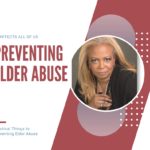Preventing Elder Abuse – Practical Things to Prevent Elderly Abuse
Practical Things to Preventing Elder Abuse
 “Elder Abuse” is a topic I’ve discussed many times on webinars, phone conferences, in coaching sessions, while teaching in classrooms and when sitting with real estate clients and their family members. Not in a million years did I ever think I would experience Elder Abuse with anyone in my family. Simply put, it affects all of us and like all other social and health problems plaguing our society, it’s much better to be proactive than reactive.
“Elder Abuse” is a topic I’ve discussed many times on webinars, phone conferences, in coaching sessions, while teaching in classrooms and when sitting with real estate clients and their family members. Not in a million years did I ever think I would experience Elder Abuse with anyone in my family. Simply put, it affects all of us and like all other social and health problems plaguing our society, it’s much better to be proactive than reactive.
When the market crashed in 2007 I had to move my mother to Las Vegas to live with her favorite nephew who is a very successful ophthalmologist for the past 40 years. I had been personally caring for my mother in my home from 2002 through 2007 here in Southern California. My cousin the surgeon was recently divorced and living alone in a 6,000 square foot home and it was perfect timing for him as he cherished the idea that he could host his favorite aunt in his home for however long I needed. The stipulation was that we hire a full-time caregiver, not a live-in, a full-timer for the weekday and part-timer for the weekends. Over time as the economy continued to worsen, the full-time caregiver finally convinced my cousin the surgeon to let her move into the home and operate as a LIVE-IN. From that point on she began to take ownership of the opportunity and became very controlling with my mother and really began to take over the house. My mother was reluctant to tell anyone of what she was experiencing, and it wasn’t until much later that we discovered that she was being abused. It was my mom’s personal doctor that contacted me to share that she felt something was not right. Mom’s doctor had been sending messages back to the family that we weren’t receiving. Finally, my mother’s personal doctor contacted me directly with her concerns. I immediately moved her back to LA with me and my sister. My mother was physiologically divested and was afraid to bother us with this nightmare. She was so grateful for all that we were doing for her well-being that she didn’t want to worry us. This is a very common story throughout our country. I have to say that it was living through this experience and just after my mother made her transition I decided to really plug in to the 50+ market and get connected with all the networking groups and various industry professionals so that I could stay on top of these things to further help my family, fellow agents/peers, and my clients.
With that in mind, today is all about practical things both you and your family members can do to prevent elder abuse.
GET THE WORD OUT
Education is the silver bullet in the fight to prevent elder abuse. Gather as much credible information as possible and communicate with your aging loved ones and any professionals with whom they interact. You might be asking, “Why educate the professionals? Don’t they already understand?” Well it’s good for multiple reasons. First, elder abuse may not be part of their everyday work concerns or training. Therefore, the professional is ill equipped to effectively recognize when it’s happening. They need and will appreciate the help. Second, it puts on notice any professional who may have had less than pure motives, that you are informed and watching.
BEWARE OF SUBSTANCE ABUSE
Alcohol and prescription drug abuse are more and more common among the elderly. Sometimes an addictive personality is the problem, but more often than not our loved ones are getting addicted to over prescribed drugs for legitimate health issues. This is so dangerous and can cause many internal issues that are hard to see until it’s too late. Also, because the drugs affect cognitive judgment, he or she becomes more vulnerable to other forms of abuse such as financial abuse.
JOIN SUPPORT GROUPS
Did you know that there are probably a dozen support groups in driving distance for aging adults and their families? I’m not kidding; they’re out there. A support group is a great place to get information and make friends who will go out of their way to be available to you and your loved one. Having a sense of community will be of great comfort when the challenges of aging come.
STAY CONNECTED
Social isolation leads to depression and poor decisions. Your loved one will become more vulnerable to scams and may even let abusers into their lives purely out of boredom and loneliness. Keep your aging loved one connected with friends and family. Get them out of the house and engaged with physical activity and hobbies.
KEEP PERSONAL INFORMATION PRIVATE
The aging population is a target for all sorts of identity theft. I’ve literally stopped a house from being stolen right out from under a client’s nose. It’s terrible. Be sure your loved ones are protecting their identity in every way possible. Here are a few good tips.
- Have them freeze their credit. It’s easy to do and prevents anyone from using their social security number to open new accounts.
- Sign them up for an identity theft protection service such as Life-lock that will alert them when there is a breach.
- Have them post and open their own mail or allow only you to do it for them.
- Warn them against ever giving their personal information over the phone. Criminals have gotten very clever and will be persuasive.
PLAN FOR THE FUTURE
Help your loved ones plan for the future. With a power of attorney or a living will, you both can address health care decisions to avoid confusion and family problems later. Seek independent advice from someone you trust before having them sign any documents.
DON’T LET JUST ANYONE IN THE DOOR
Carefully interview anyone who might be given access to your loved one’s home such as a part-time healthcare worker. Don’t be afraid to ask for referrals before any hiring decision is made. Finally, feel free to drop in unannounced to get a more authentic view of what happens on a daily basis.
Founder, Broker of Record
Toni Patillo & Associates
ToniPatillo.com




































